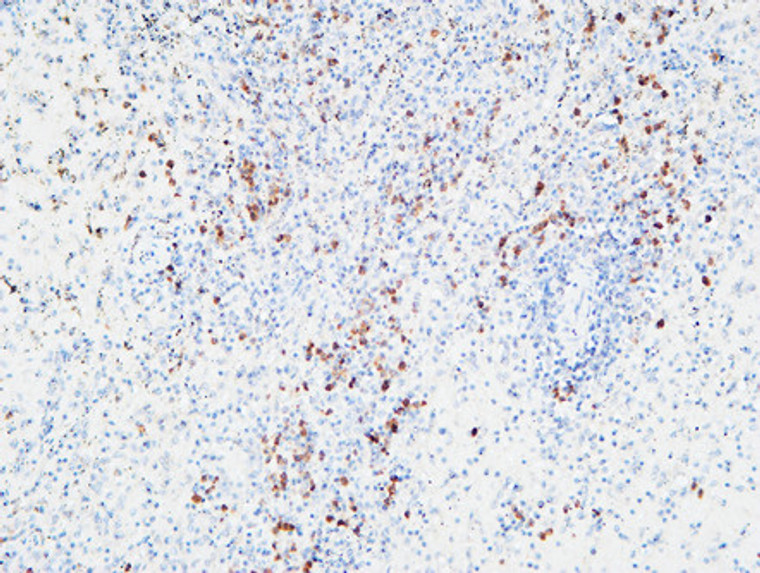| Host: |
Rabbit |
| Applications: |
WB/IHC/IF/ELISA |
| Reactivity: |
Human/Rat/Mouse |
| Note: |
STRICTLY FOR FURTHER SCIENTIFIC RESEARCH USE ONLY (RUO). MUST NOT TO BE USED IN DIAGNOSTIC OR THERAPEUTIC APPLICATIONS. |
| Short Description: |
Rabbit polyclonal antibody anti-Interleukin-6 receptor subunit alpha (221-270 aa) is suitable for use in Western Blot, Immunohistochemistry, Immunofluorescence and ELISA research applications. |
| Clonality: |
Polyclonal |
| Conjugation: |
Unconjugated |
| Isotype: |
IgG |
| Formulation: |
Liquid in PBS containing 50% Glycerol, 0.5% BSA and 0.02% Sodium Azide. |
| Purification: |
The antibody was affinity-purified from rabbit antiserum by affinity-chromatography using epitope-specific immunogen. |
| Concentration: |
1 mg/mL |
| Dilution Range: |
IHC-P 100-300WB 1:500-1:2000ELISA 1:10000IF 1:50-200 |
| Storage Instruction: |
Store at-20°C for up to 1 year from the date of receipt, and avoid repeat freeze-thaw cycles. |
| Gene Symbol: |
IL6R |
| Gene ID: |
3570 |
| Uniprot ID: |
IL6RA_HUMAN |
| Immunogen Region: |
221-270 aa |
| Specificity: |
IL-6R Alpha Polyclonal Antibody detects endogenous levels of IL-6R Alpha protein. |
| Immunogen: |
The antiserum was produced against synthesized peptide derived from the Internal region of human IL6R at the amino acid range 221-270 |
| Post Translational Modifications | A short soluble form is released from the membrane by proteolysis. The sIL6R is formed mostly by limited proteolysis of membrane-bound receptors, a process referred to as ectodomain shedding, but is also directly secreted from the cells after alternative mRNA splicing. mIL6R is cleaved by the proteases ADAM10 and ADAM17. Glycosylated. Glycosylation is dispensable for transport, signaling, and cell-surface turnover. Glycosylation at Asn-55 is a protease-regulatory exosite. Glycosylation is required for ADAM17-mediated proteolysis. |
| Function | Part of the receptor for interleukin 6. Binds to IL6 with low affinity, but does not transduce a signal. Signal activation necessitate an association with IL6ST. Activation leads to the regulation of the immune response, acute-phase reactions and hematopoiesis. The interaction with membrane-bound IL6R and IL6ST stimulates 'classic signaling', the restricted expression of the IL6R limits classic IL6 signaling to only a few tissues such as the liver and some cells of the immune system. Whereas the binding of IL6 and soluble IL6R to IL6ST stimulates 'trans-signaling'. Alternatively, 'cluster signaling' occurs when membrane-bound IL6:IL6R complexes on transmitter cells activate IL6ST receptors on neighboring receiver cells (Probable). Isoform 1: Signaling via the membrane-bound IL6R is mostly regenerative and anti-inflammatory (Probable). Drives naive CD4(+) T cells to the Th17 lineage, through 'cluster signaling' by dendritic cells. Isoform 2: Soluble form of IL6 receptor (sIL6R) that acts as an agonist of IL6 activity. The IL6:sIL6R complex (hyper-IL6) binds to IL6ST/gp130 on cell surfaces and induces signaling also on cells that do not express membrane-bound IL6R in a process called IL6 'trans-signaling'. sIL6R is causative for the pro-inflammatory properties of IL6 and an important player in the development of chronic inflammatory diseases. In complex with IL6, is required for induction of VEGF production. Plays a protective role during liver injury, being required for maintenance of tissue regeneration. 'Trans-signaling' in central nervous system regulates energy and glucose homeostasis. Soluble interleukin-6 receptor subunit alpha: Soluble form of IL6 receptor (sIL6R) that acts as an agonist of IL6 activity. The IL6:sIL6R complex (hyper-IL6) binds to IL6ST/gp130 on cell surfaces and induces signaling also on cells that do not express membrane-bound IL6R in a process called IL6 'trans-signaling'. sIL6R is causative for the pro-inflammatory properties of IL6 and an important player in the development of chronic inflammatory diseases. In complex with IL6, is required for induction of VEGF production. Plays a protective role during liver injury, being required for maintenance of tissue regeneration. 'Trans-signaling' in central nervous system regulates energy and glucose homeostasis. |
| Protein Name | Interleukin-6 Receptor Subunit AlphaIl-6 Receptor Subunit AlphaIl-6r Subunit AlphaIl-6r-AlphaIl-6raIl-6r 1Membrane Glycoprotein 80Gp80Cd Antigen Cd126 Cleaved Into - Soluble Interleukin-6 Receptor Subunit AlphaSil6r |
| Database Links | Reactome: R-HSA-1059683Reactome: R-HSA-110056Reactome: R-HSA-112411Reactome: R-HSA-6785807Reactome: R-HSA-9616222Reactome: R-HSA-9679191 |
| Cellular Localisation | Isoform 1: Cell MembraneSingle-Pass Type I Membrane ProteinIsoform 2: SecretedSoluble Interleukin-6 Receptor Subunit Alpha: Secreted |
| Alternative Antibody Names | Anti-Interleukin-6 Receptor Subunit Alpha antibodyAnti-Il-6 Receptor Subunit Alpha antibodyAnti-Il-6r Subunit Alpha antibodyAnti-Il-6r-Alpha antibodyAnti-Il-6ra antibodyAnti-Il-6r 1 antibodyAnti-Membrane Glycoprotein 80 antibodyAnti-Gp80 antibodyAnti-Cd Antigen Cd126 Cleaved Into - Soluble Interleukin-6 Receptor Subunit Alpha antibodyAnti-Sil6r antibodyAnti-IL6R antibody |
Information sourced from Uniprot.org
12 months for antibodies. 6 months for ELISA Kits. Please see website T&Cs for further guidance










